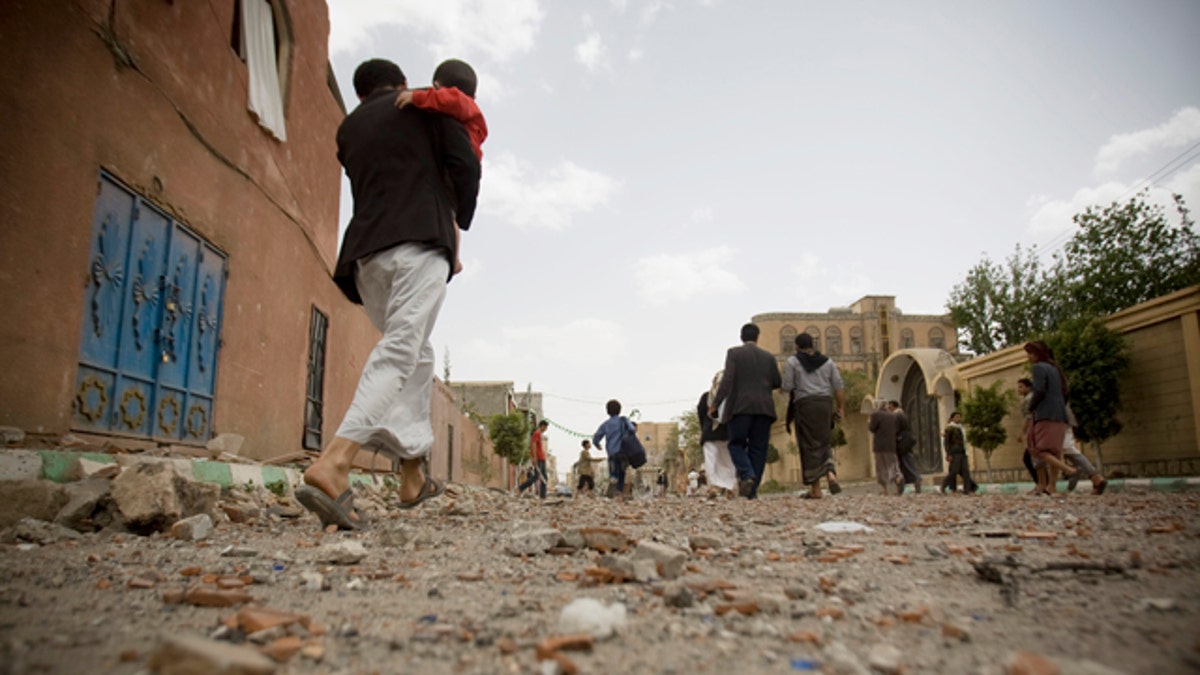
FILE - In this Wednesday, April 8, 2015 file photo, people flee after a Saudi-led airstrike in Sanaa, Yemen. (AP Photo/Hani Mohammed, File)
UNITED NATIONS – The U.N. has announced that its special envoy to Yemen is stepping down after four years of efforts at a peaceful political transition in the Arab world's poorest country fell apart amid a Shiite rebel uprising and Saudi-led airstrikes.
A statement late Wednesday said Jamal Benomar "has expressed an interest in moving on to another assignment" and that his successor will be named "in due course."
Benomar had come under criticism from some in the Middle East, particularly Saudi Arabia, as his efforts to broker peace showed little success. He regularly briefed the Security Council on Yemen and was well regarded by many diplomats.
Yemen is now under weeks of airstrikes by a Saudi-led coalition in an attempt to push back Shiite Houthi rebels who swept south from their region near the Saudi border and caused the president to flee.
The U.N. said in its statement that it will "spare no efforts to re-launch the peace process," but the challenge has grown as the fighting in Yemen has become a kind of proxy war between Saudi Arabia and its Sunni allies and Iran, a predominantly Shiite nation that has supported the Houthis. More than 700 people have been killed since the airstrikes began.
U.N. diplomats, speaking on condition of anonymity because talks were private, said that ministers from the Sunni-led Gulf Cooperation Council met Secretary-General Ban Ki-moon during a trip to Kuwait in late March and told him of their unhappiness with Benomar.
The pressure on Benomar, a Moroccan diplomat who had served as an envoy in Iraq and Afghanistan, had grown as the Houthis grew bolder in recent weeks. By late last week, Saudi Arabia's ambassador to the U.N. was strongly hinting that Benomar was on the way out.
"We continue to support the mission of the special adviser to the secretary-general. ... Whoever the secretary-general designates as his special adviser, for the time being Jamal Benomar, yes," the ambassador, Abdallah Al-Mouallimi, told reporters Friday.
Benomar had been tasked in 2011 with guiding a peaceful transition for Yemen from the chaos of the Arab Spring. For a while, the country was praised as a model for such a transition, but as the new U.N. statement pointed out, "unfortunately, this process was interrupted with the dramatic escalation of violence."
The U.N. Security Council this week imposed an arms embargo on Houthi leaders and again demanded that they withdraw and stop the violence. The council also imposed an arms embargo on former president Ali Abdullah Saleh, who had stepped down in early 2012 as part of the U.N.-guided transition and now has aligned himself with the Houthis.
The Gulf Cooperation Council -- which includes Yemen's neighbors Saudi Arabia and Oman as well as Bahrain, Kuwait, Qatar and the United Arab Emirates -- put together the plan for a political transition in Yemen that was only partially carried out. The Security Council this week called for a return to U.N.-led negotiations and full implementation of the plan, which includes drafting a constitution and elections.
